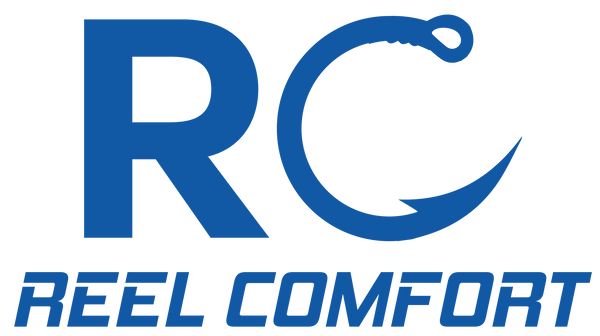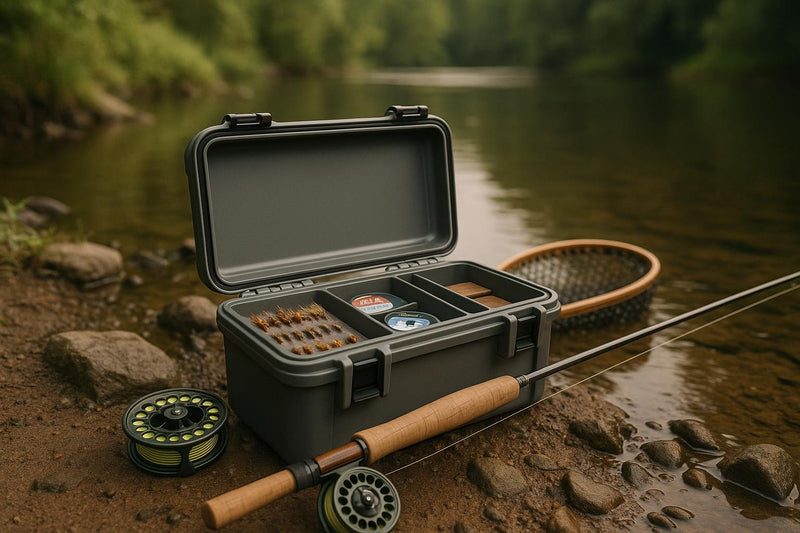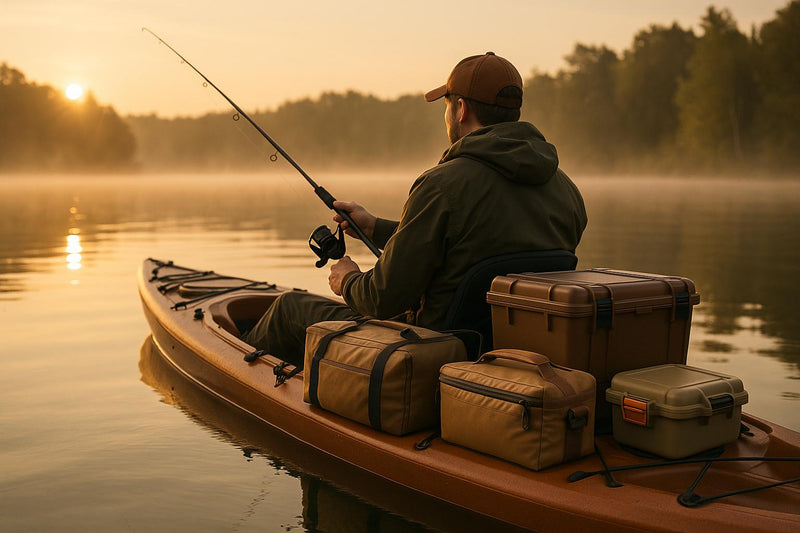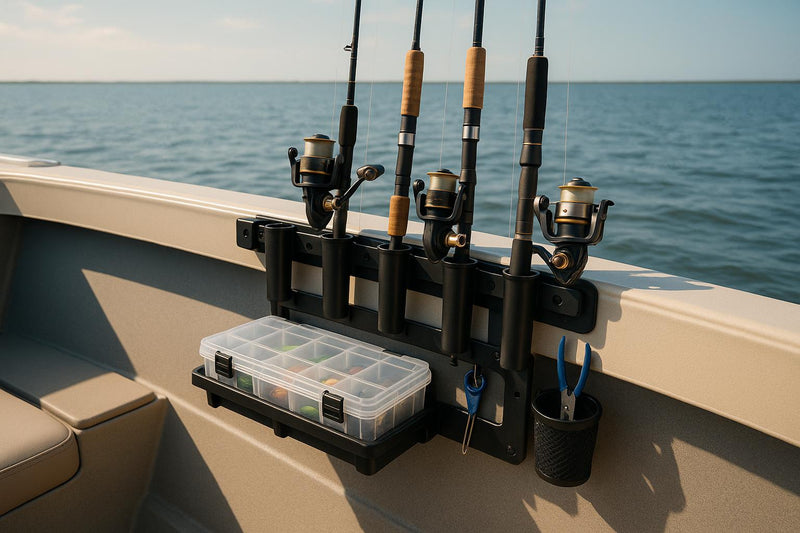When shopping for fishing apparel, the right certifications can ensure your gear is safe, durable, and eco-conscious. From chemical safety to recycled materials, these certifications validate fabric quality and production practices. Here’s a quick overview of the top 10 fabric certifications:
- GOTS: Focuses on organic fibers and bans harmful chemicals.
- OEKO-TEX Standard 100: Ensures textiles are free from harmful substances.
- bluesign®: Prioritizes safe chemical use and resource efficiency.
- GRS: Verifies recycled content and responsible production.
- Fair Trade Certified: Ensures fair wages and safe working conditions.
- B Corp: Evaluates overall business sustainability.
- USDA Organic: Certifies chemical-free farming for natural fibers.
- Cradle to Cradle Certified™: Covers the entire lifecycle of textiles.
- EU Ecolabel: Recognizes high environmental standards for EU products.
- FSC Certified Viscose: Promotes responsible sourcing of wood-based fabrics.
These certifications help you choose fishing gear that combines performance features like quick-dry and water resistance with responsible manufacturing practices. Look for certified products to make informed, eco-friendly choices.
1. Global Organic Textile Standard (GOTS)
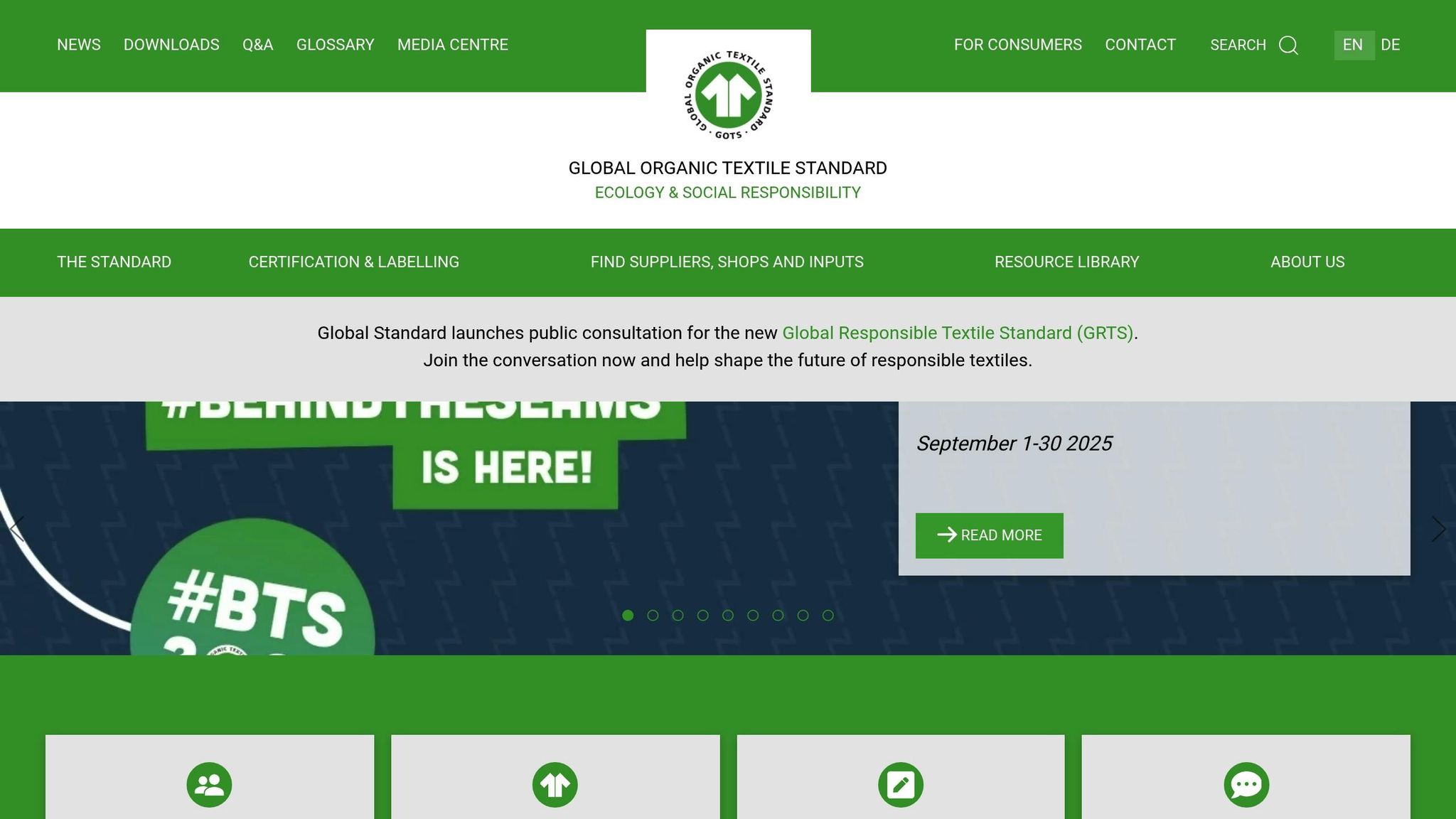
The Global Organic Textile Standard (GOTS) is one of the most trusted certifications for fabrics made with organic materials. To earn this certification, textiles must contain at least 70% organic fibers and meet stringent environmental and social standards throughout the production process.
Environmental Impact and Focus on Sustainability
GOTS certification prioritizes reducing environmental harm by strictly regulating chemical use and promoting energy-efficient practices. It bans harmful substances often found in traditional textile production, such as heavy metals, formaldehyde, and aromatic solvents. By doing so, it ensures that fabrics are safer for both people and the planet.
Another key requirement is wastewater treatment at wet-processing sites. For fishing apparel, this means features like quick-dry and water-resistant properties - seen in Reel Comfort's Fishing shorts - can be achieved without harming the environment. Certified facilities are also required to monitor and reduce their energy consumption, which helps shrink the carbon footprint of the final product.
These eco-friendly processes not only protect the environment but also enhance the durability and performance of fabrics, making them ideal for the demanding conditions anglers face.
Importance for Performance Fabrics in Fishing Gear
While organic cotton is the foundation of most GOTS-certified fabrics, the standard allows for innovative fabric blends that maintain the performance features essential for fishing apparel. These fabrics can provide moisture-wicking capabilities, UV protection, and durability, all while meeting organic standards. Rigorous testing ensures that GOTS-certified materials hold up against saltwater, sun exposure, and repeated wear - key qualities for keeping anglers comfortable and protected.
The standard also permits up to 30% of the fabric to include synthetic fibers, such as recycled polyester, to enhance performance without losing certification. This flexibility allows manufacturers to create fishing apparel that balances sustainability with functionality.
For instance, Reel Comfort’s Mens Fishing Shorts showcase how sustainable materials can deliver high-performance designs perfect for long days on the water.
Certification Standards for Eco-Friendly Fabrics
GOTS certification involves rigorous requirements to ensure both sustainability and product quality. Manufacturers must provide complete transparency at every stage of production, from sourcing organic fibers to assembling the final garment. Organic fiber content is verified through documentation from certified organic farms, and even the non-organic components of blended fabrics must meet strict environmental criteria. Additionally, packaging, labeling, dyes, and finishing agents must align with eco-friendly standards to maintain the certification’s credibility.
Ethical Practices and Traceability
Beyond environmental considerations, GOTS certification enforces strong ethical standards. Certified facilities must adhere to fair labor practices, including paying fair wages, ensuring safe working conditions, and prohibiting child labor and discrimination. Detailed record-keeping and regular inspections ensure full traceability, guaranteeing that every step of production aligns with both environmental and ethical principles.
GOTS-certified apparel offers a combination of reliable performance and responsible manufacturing, making it a solid choice for anglers who care about quality and sustainability.
2. OEKO-TEX Standard 100
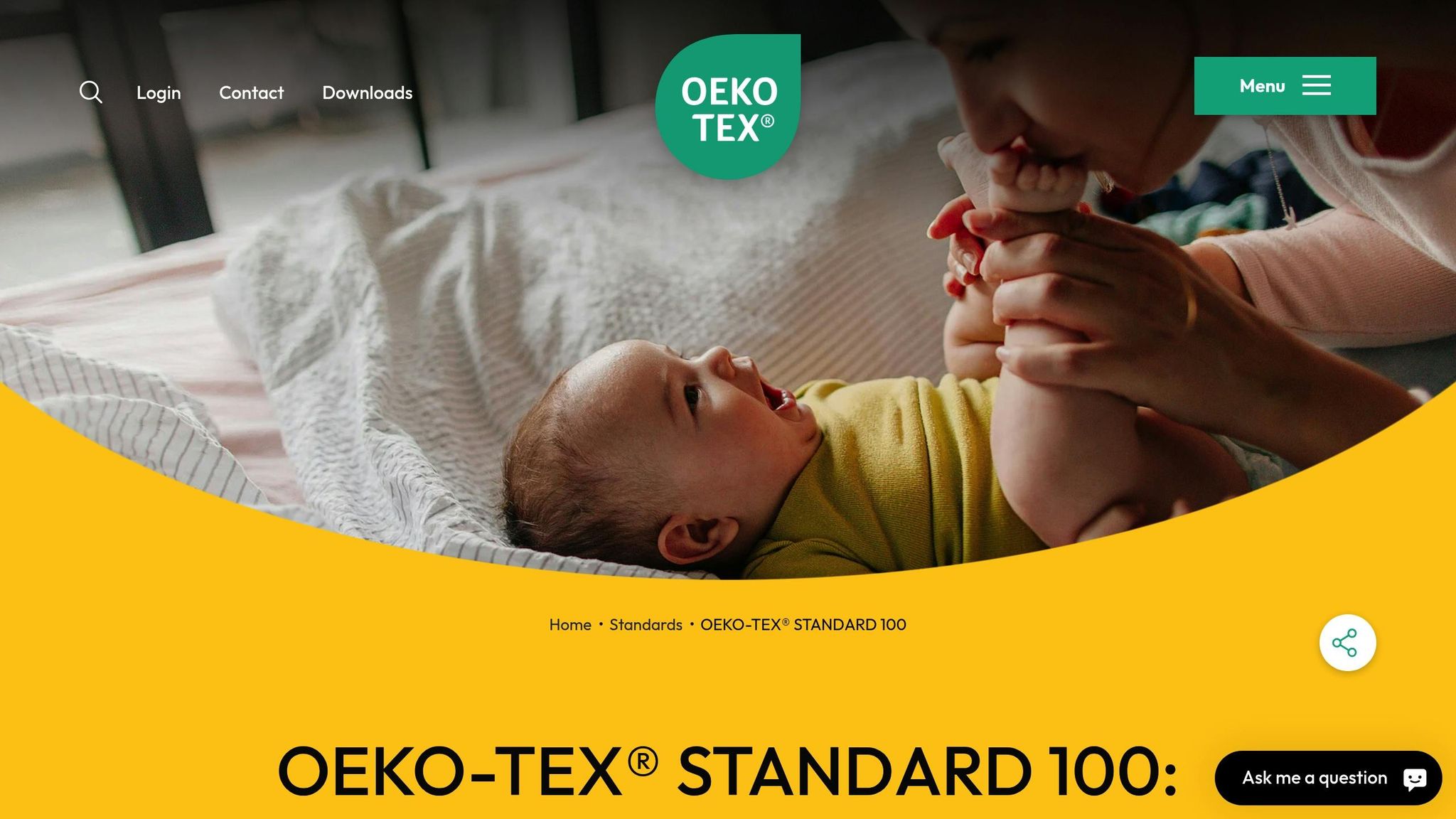
While GOTS focuses on organic standards, OEKO-TEX Standard 100 zeroes in on textile safety, ensuring products are free of harmful substances. This globally recognized testing system evaluates every part of a textile product - from fibers and threads to buttons and zippers - to confirm they meet strict chemical safety standards.
Certification Requirements for Eco-Friendly Materials
OEKO-TEX certification involves rigorous testing of all textile components to confirm that no hazardous chemicals remain, even after treatments. This is especially important for garments that come into direct contact with the skin, ensuring safety and comfort for the wearer.
Relevance to Performance Fabrics in Fishing Apparel
Performance fabrics in fishing apparel often undergo treatments to enhance features like water resistance, quick-drying, and UV protection. OEKO-TEX certification ensures these treatments are safe and free of harmful substances. For instance, Reel Comfort's Fishing Shorts showcase advanced fabric technology while meeting certified safety standards. Their Men's Fishing Shorts demonstrate how functionality and chemical safety can seamlessly coexist, offering wearers peace of mind alongside performance.
3. bluesign®
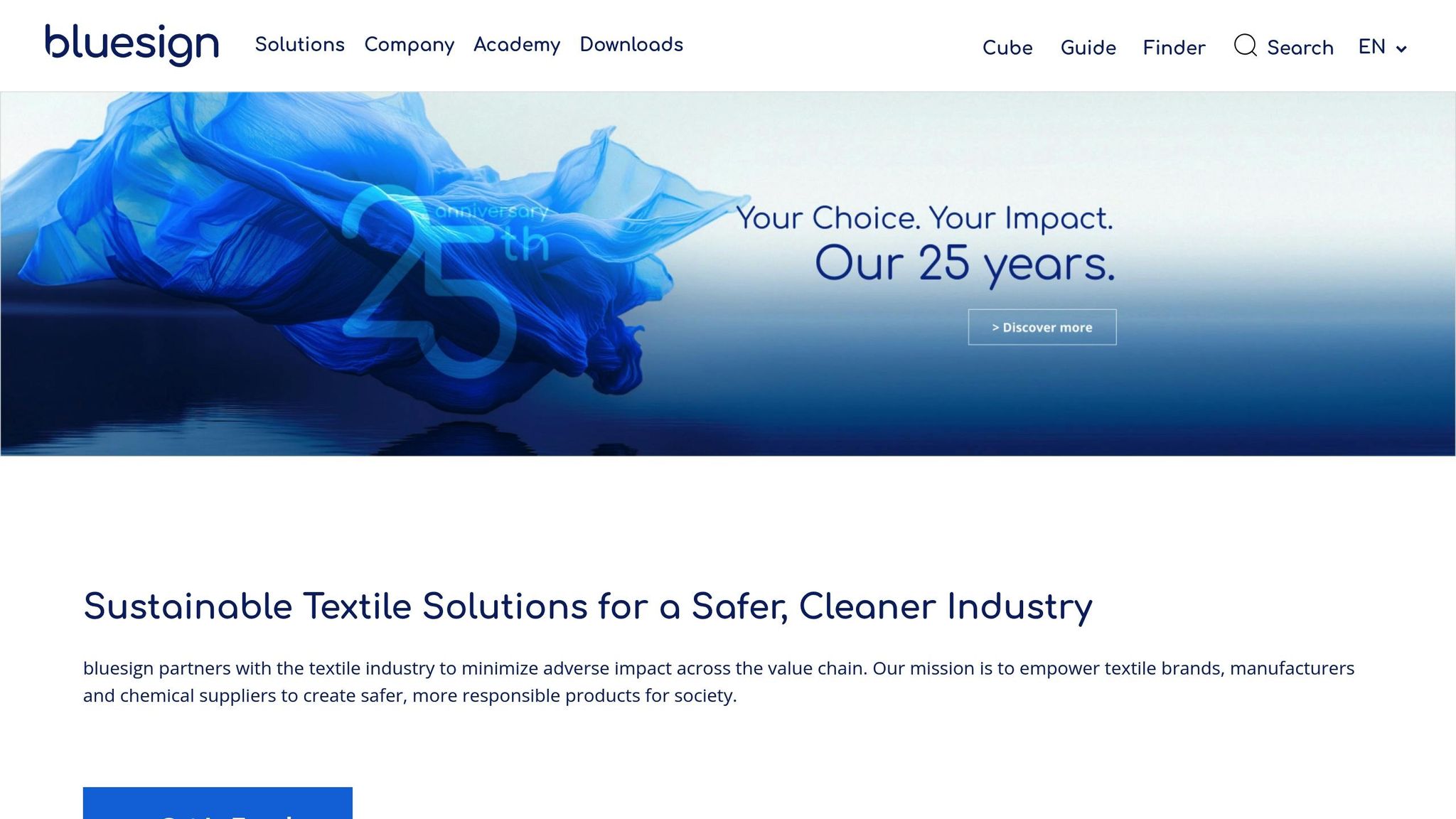
The bluesign® system, developed in Switzerland, is a certification program that ensures the entire textile supply chain eliminates harmful substances right from the start.
A Focus on Environmental Responsibility
bluesign® emphasizes environmental responsibility by focusing on five core principles: resource efficiency, consumer safety, water and air emissions, and workplace health and safety. This system holds manufacturers to strict standards for chemical use, energy efficiency, and waste management throughout production.
By requiring only approved chemicals and dyes, bluesign® works to reduce pollution at its source. Manufacturers are also expected to demonstrate ongoing progress in reducing energy consumption, minimizing water emissions, and cutting waste. These efforts reflect a strong commitment to environmentally conscious production.
Meeting Certification Standards for Sustainable Materials
To achieve certification, manufacturers must undergo a thorough evaluation of their production processes. This includes using chemicals exclusively from a pre-approved database and implementing strict chemical management systems. Proper storage, handling, and disposal of materials are mandatory, supported by regular audits and comprehensive training programs for workers.
Importance for Performance Fabrics in Fishing Gear
For fishing apparel, where performance matters as much as sustainability, bluesign® certification ensures that fabrics meet high standards. Certified treatments provide features like water resistance and quick-drying capabilities while reducing environmental harm. Whether you're shopping for fishing shorts or men's fishing shorts, bluesign® guarantees both functionality and eco-conscious production.
Transparency and Ethical Practices
One of the standout aspects of bluesign® certification is its emphasis on traceability and ethical production. The system ensures complete transparency across the supply chain, from raw materials to finished products. Manufacturers must maintain detailed records and comply with regular audits to verify supplier practices and working conditions, reinforcing their commitment to environmental and social responsibility.
4. Global Recycled Standard (GRS)
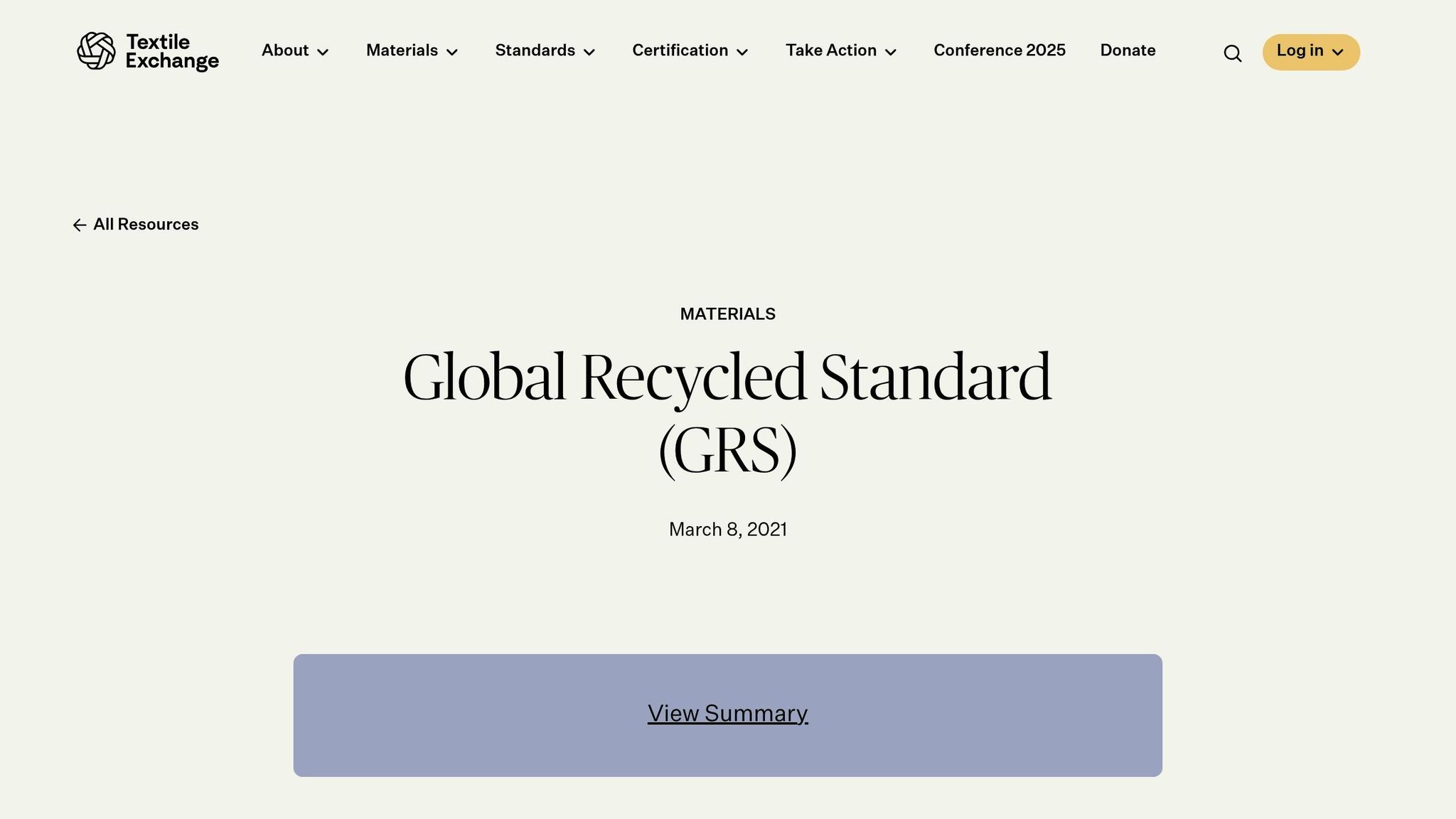
The Global Recycled Standard (GRS) is a globally recognized certification designed to verify the recycled content in products while ensuring responsible practices throughout the production process. Overseen by Textile Exchange, a non-profit organization dedicated to sustainable practices, GRS serves as a trusted standard for brands aiming to use authentic recycled materials.
Prioritizing Environmental Responsibility
GRS certification emphasizes reducing environmental impact by requiring the use of verified recycled materials. This not only decreases dependence on virgin resources but also helps minimize waste. The standard enforces strict guidelines for chemical use, water management, and energy efficiency, all of which contribute to lowering the environmental footprint of textile manufacturing. These measures are particularly important for creating high-performance fabrics needed in fishing apparel.
Certification Criteria for Recycled Materials
To earn GRS certification, products must include at least 20% recycled content, though only those with 50% or more recycled material can display the GRS logo. Every stage of the supply chain, from recycling to final production, is subject to independent audits. The certification also requires adherence to rigorous environmental, chemical, and social responsibility standards. These include avoiding hazardous chemicals, implementing proper wastewater treatment, and ensuring fair labor practices.
Typical GRS-certified materials include recycled polyester (rPET) from plastic bottles, recycled nylon derived from fishing nets or industrial waste, and recycled cotton. These materials are particularly well-suited for performance fabrics used in fishing shorts, where strength and functionality are key.
Ensuring Traceability and Ethical Standards
One of GRS’s core requirements is complete traceability of recycled materials. This involves maintaining detailed documentation and conducting frequent audits to track the origin of recycled inputs. The certification ensures transparency by requiring clear chain-of-custody records and third-party inspections to prevent misleading claims about recycled content. Covering the entire production chain - from recyclers to manufacturers and brands - this rigorous oversight provides consumers with confidence in the authenticity of certified products.
Importance for Fishing Apparel Performance Fabrics
For fishing apparel, GRS-certified fabrics offer the perfect blend of performance and environmental responsibility. These materials deliver durability and moisture management while aligning with eco-conscious values. Anglers looking for sustainable gear can trust GRS-certified options, such as fishing shorts and men's fishing shorts, to meet their needs. The certification is also highly relevant for water-resistant gear and quick-dry fabric technology. As demand for sustainable products grows, highlighting GRS certification can provide a strong advantage in the competitive fishing apparel market.
5. Fair Trade Certified
Fair Trade Certified, overseen by Fair Trade USA, focuses on ensuring fair wages, safe working environments, and community-driven benefits, all while encouraging responsible resource management.
Certification Requirements
To earn Fair Trade Certified status, textile producers must undergo rigorous third-party audits. These audits confirm compliance with strict social and environmental standards, ensuring fair wages, safe working conditions, and investments in local communities. A well-documented supply chain is essential, offering full traceability from raw materials to the final product. Additionally, producers are required to adopt practices that minimize environmental impact while maintaining social accountability.
This transparent chain-of-custody ensures the material's reliability for crafting high-performance fishing apparel.
Relevance to Performance Fabrics in Fishing Apparel
Fair Trade practices align seamlessly with the demand for sustainable and ethically produced materials in fishing apparel. By incorporating Fair Trade Certified fabrics, brands can deliver products that meet both ethical and performance expectations. These materials serve as the backbone for advanced features like quick-dry technology, found in options like Fishing Shorts and Men’s Fishing Shorts.
6. B Corp Certification
B Corp Certification stands out as a comprehensive standard for assessing business accountability. Managed by B Lab, a nonprofit organization, this certification evaluates companies based on five key areas: governance, workers, community, environment, and customers. Unlike certifications that focus solely on specific products, B Corp takes a broader view, analyzing the entire business structure and its impact.
Environmental Impact and Sustainability Focus
To earn B Corp Certification, companies must achieve a minimum score of 80 points on B Lab's Impact Assessment. This assessment measures factors like energy efficiency, waste reduction, water conservation, and sustainable sourcing. Businesses are also required to track their carbon footprint and implement strategies to reduce it, incorporating these efforts into their broader decision-making processes. For textile manufacturers, this means adopting cleaner production methods, minimizing chemical use, and embracing circular economy practices.
Certification Requirements for Eco-Friendly Materials
The certification process involves rigorous documentation and independent verification of environmental practices. Companies must complete an in-depth Impact Assessment that examines material sourcing, production techniques, and supply chain management. For textile producers, this translates to proving they use responsibly sourced fibers, maintain effective chemical management systems, and have proper water treatment protocols in place.
Traceability and Ethical Production Standards
B Corp Certification also emphasizes full supply chain transparency, ensuring companies meet ethical production and environmental standards throughout their operations.
Relevance to Performance Fabrics in Fishing Apparel
For the fishing apparel industry, B Corp Certification provides a framework to create high-performance gear that prioritizes sustainability without sacrificing functionality. This focus encourages advancements in quick-dry and water-resistant fabric technologies that remain effective while reducing environmental impacts.
sbb-itb-cb0a783
7. USDA Organic
The USDA Organic certification ensures that textile fibers are grown and processed without the use of synthetic pesticides, herbicides, or genetically modified organisms (GMOs). Overseen by the USDA National Organic Program (NOP), this certification guarantees that natural fibers like cotton, hemp, and wool meet strict organic standards, from cultivation to final production.
Certification Requirements for Eco-Friendly Materials
To earn USDA Organic certification, farms must practice chemical-free farming for at least three years and undergo annual inspections by USDA-accredited agents. For cotton, this means eliminating synthetic fertilizers, pesticides, and defoliants commonly used in conventional farming methods.
Manufacturers working with USDA Organic fibers are also required to keep organic and non-organic materials separate during processing. This includes using designated storage spaces, thorough cleaning protocols between production runs, and detailed record-keeping. Additionally, any processing aids or chemicals used must comply with the National List of Allowed and Prohibited Substances.
Environmental Benefits and Focus on Sustainability
By adhering to these standards, USDA Organic farming supports healthier soil, reduces water consumption, and avoids synthetic pesticides, which helps protect ecosystems. These practices also result in fabrics that are gentler on the skin, making them especially useful for performance wear. For example, high-performance Fishing Shorts are designed to be worn for extended periods and benefit from the skin-friendly properties of organic materials.
Traceability and Ethical Production Standards
Every step of the production process must be documented for at least five years, ensuring complete traceability of organic fibers. This transparent chain of custody allows consumers to verify the organic claims of textile products, reinforcing trust in the certification.
Application in Performance Fishing Apparel
USDA Organic fabrics bring natural benefits like moisture-wicking and UV protection, which are essential for quick-drying and water-resistant gear. These features make them an excellent choice for high-performance Mens Fishing Shorts and Fishing Shorts, providing comfort and durability in demanding fishing conditions. By combining sustainability with functionality, this certification enhances the appeal of eco-conscious angler apparel.
8. Cradle to Cradle Certified™
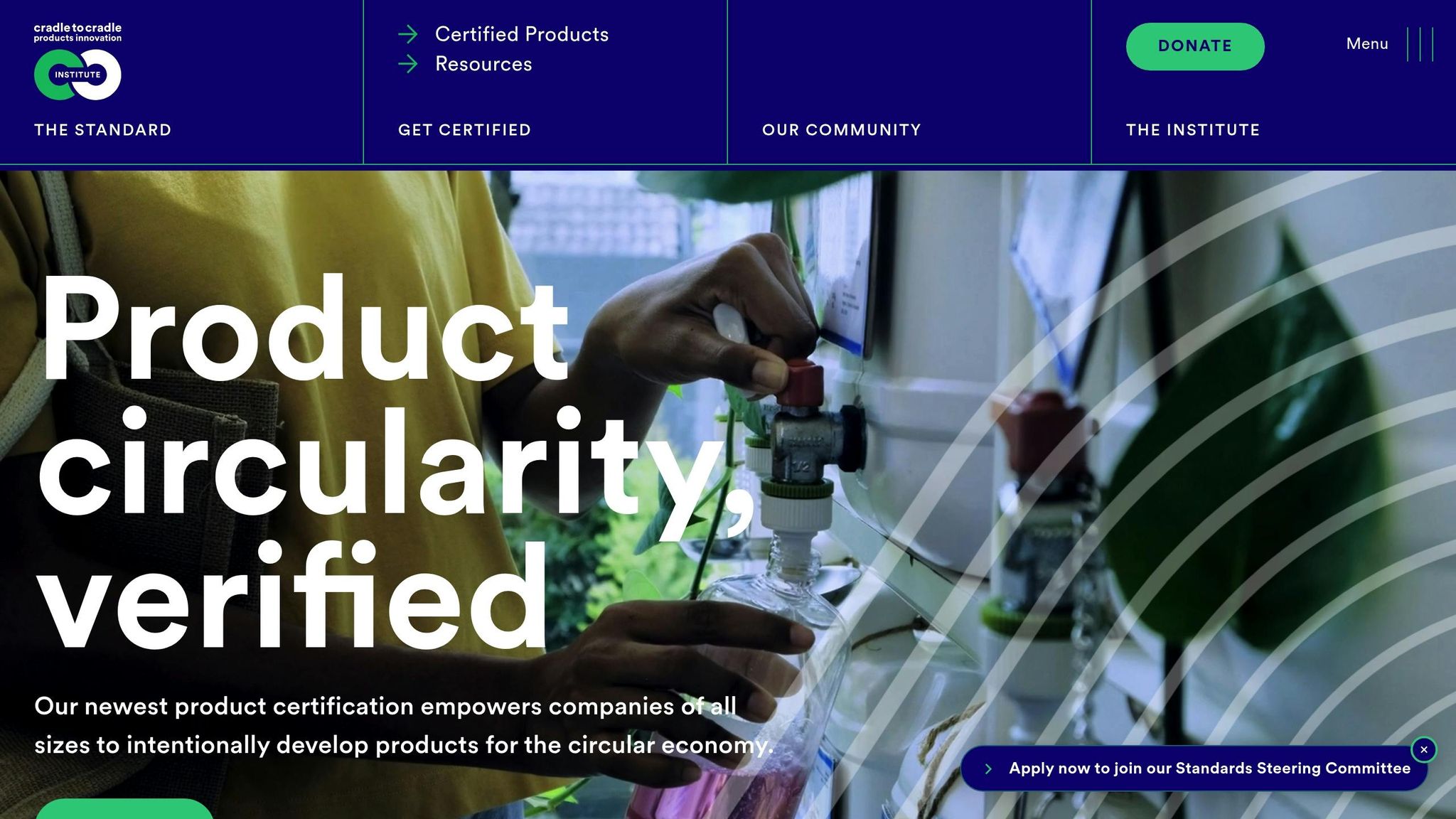
Cradle to Cradle Certified™ evaluates textiles across their entire lifecycle, focusing on five key areas: material health, material reutilization, renewable energy, water stewardship, and social fairness.
Unlike certifications that concentrate solely on organic content or chemical restrictions, Cradle to Cradle Certified™ takes a broader approach, addressing sustainability from multiple angles. It uses a tiered system - Bronze, Silver, Gold, and Platinum - to indicate levels of achievement. This system not only highlights progress but also provides a clear roadmap for brands aiming to improve sustainability, which is particularly relevant for fishing apparel.
Environmental Impact and Sustainability Focus
At its core, Cradle to Cradle Certified™ promotes circular design principles, ensuring materials can be safely reused, recycled, or composted once their lifecycle ends. By 2024, more than 1,000 products from over 300 companies worldwide have earned this certification, leading to significant reductions in hazardous chemicals and greater use of recycled materials. To maintain certification, companies must undergo periodic reviews, encouraging continuous improvement.
Certification Requirements for Eco-Friendly Materials
To achieve Cradle to Cradle Certified™ status, manufacturers must meet stringent criteria across all five categories:
- Material Health: Use of safe, non-toxic materials and elimination of harmful chemicals.
- Material Reutilization: Designing fabrics to be recyclable or biodegradable, ensuring they can re-enter natural or technical cycles.
- Renewable Energy: Incorporating renewable energy in production and reducing carbon emissions.
- Water Stewardship: Practicing responsible water management.
- Social Fairness: Upholding ethical labor practices and ensuring fair working conditions throughout the supply chain.
Manufacturers must provide detailed documentation of their processes, material sources, and environmental impact. Certified assessment bodies verify compliance, ensuring transparency and accountability.
Traceability and Ethical Production Standards
Transparency is a cornerstone of the Cradle to Cradle Certified™ process. Companies are required to trace the origins of all materials, verify ethical labor practices, and demonstrate responsible resource management. This level of traceability not only prevents greenwashing but also builds consumer trust in certified products. For fishing apparel, this transparency aligns perfectly with the performance and ethical standards that modern consumers expect.
Relevance to Performance Fabrics in Fishing Apparel
For fishing apparel, Cradle to Cradle Certified™ fabrics ensure high performance while meeting eco-friendly standards. These materials maintain essential features like water resistance and quick-drying capabilities while being safe for prolonged skin contact - qualities that are crucial for products like Fishing shorts and Mens Fishing Shorts.
Brands such as Reel Comfort can use Cradle to Cradle Certified™ fabrics to stand out in the sustainable fishing apparel market. By combining environmental responsibility with high-performance features, they can appeal to eco-conscious anglers who value both functionality and sustainability.
9. EU Ecolabel
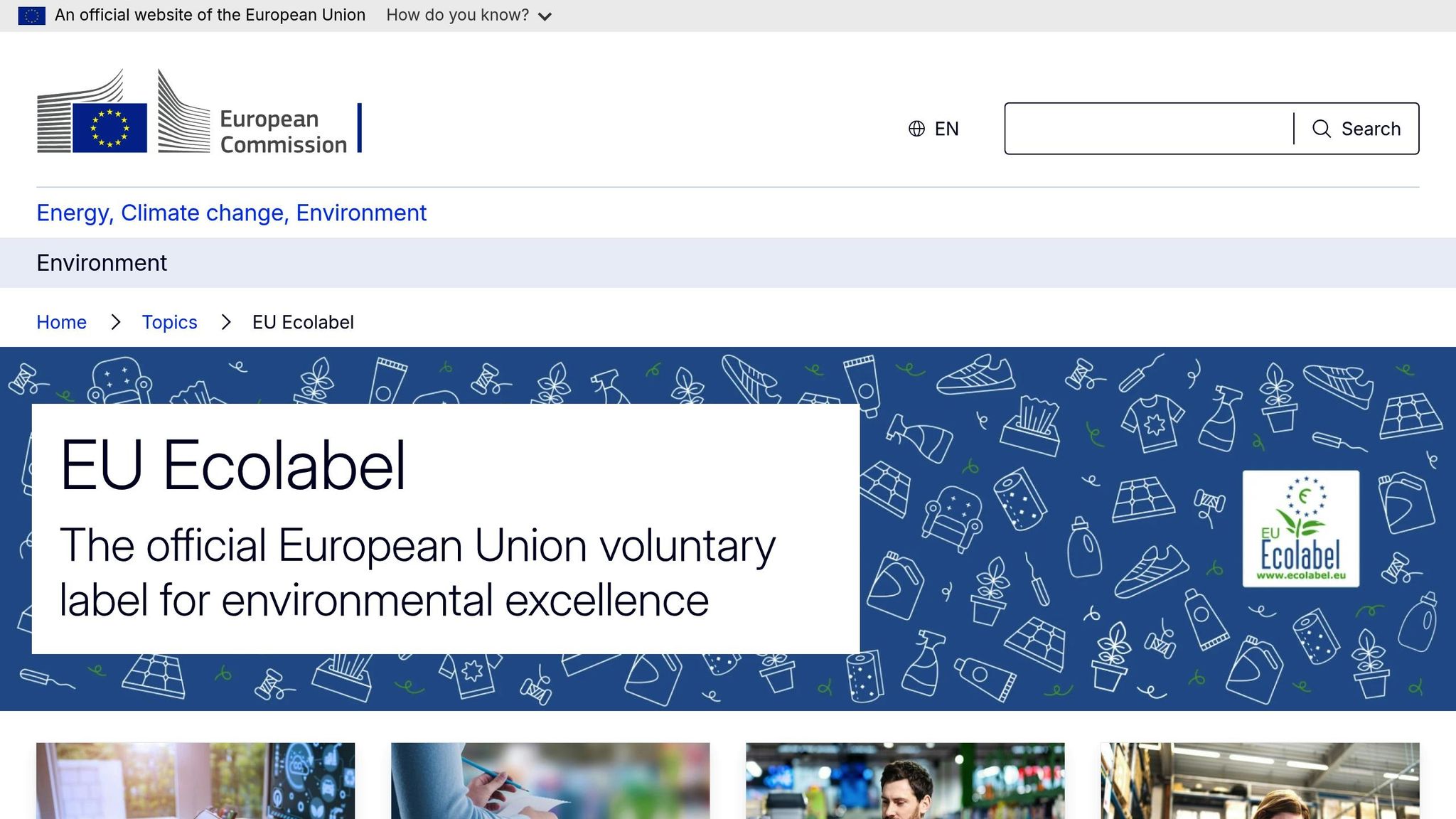
The EU Ecolabel stands as the only EU-wide ISO 14024 Type I ecolabel, widely acknowledged for its high environmental standards. This voluntary certification, verified by third parties, identifies products that excel in environmental performance throughout their entire lifecycle - including textiles used in fishing gear.
What sets the EU Ecolabel apart is its exclusivity: it only certifies the top 10–20% of products in terms of environmental performance. This ensures that any product bearing the label meets some of the highest benchmarks for sustainability and quality.
Environmental Impact and Sustainability Focus
The EU Ecolabel evaluates textiles from start to finish - covering everything from raw material extraction to the end of the product's life. This certification encompasses a variety of materials often found in fishing gear, such as synthetic fibers, laminates, membranes, coatings, and accessories.
A key feature of EU Ecolabel textiles is their strict limits on perfluorinated chemicals (PFCs). These restrictions help protect ecosystems while still allowing for water-repellent performance. By using EU Ecolabel-certified fabrics, manufacturers can produce water-resistant gear that balances functionality with eco-conscious design.
Additionally, the certification aligns with broader EU sustainability initiatives, such as the Ecodesign for Sustainable Products Regulation. This regulation is set to influence all textile products, including performance fabrics, on the European market. Such alignment ensures that EU Ecolabel-certified materials remain relevant as environmental standards continue to evolve.
Certification Requirements for Eco-Friendly Materials
Earning the EU Ecolabel requires meeting stringent criteria across multiple areas: chemical use, energy consumption, water management, waste reduction, and comprehensive supply chain documentation.
Relevance to Performance Fabrics in Fishing Apparel
Beyond its environmental focus, the EU Ecolabel also ensures that certified fabrics meet practical performance needs. Its "Fitness for Use" criteria are particularly relevant to fishing apparel, as they cover essential qualities like resistance to rubbing, abrasion, and overall durability - key for gear that faces harsh fishing conditions. These standards complement features like quick-dry properties and water resistance, which are must-haves for performance fishing gear.
For example, products like Fishing shorts and Mens Fishing Shorts benefit from EU Ecolabel certification. This ensures the fabrics can endure saltwater, UV exposure, and physical wear while maintaining comfort and protection.
Brands like Reel Comfort can use EU Ecolabel-certified fabrics to show their dedication to environmental responsibility without compromising on the quick-dry technology and water resistance that anglers rely on. In an increasingly eco-conscious market, this certification offers manufacturers a clear way to stand out.
10. FSC (Forest Stewardship Council) Certified Viscose
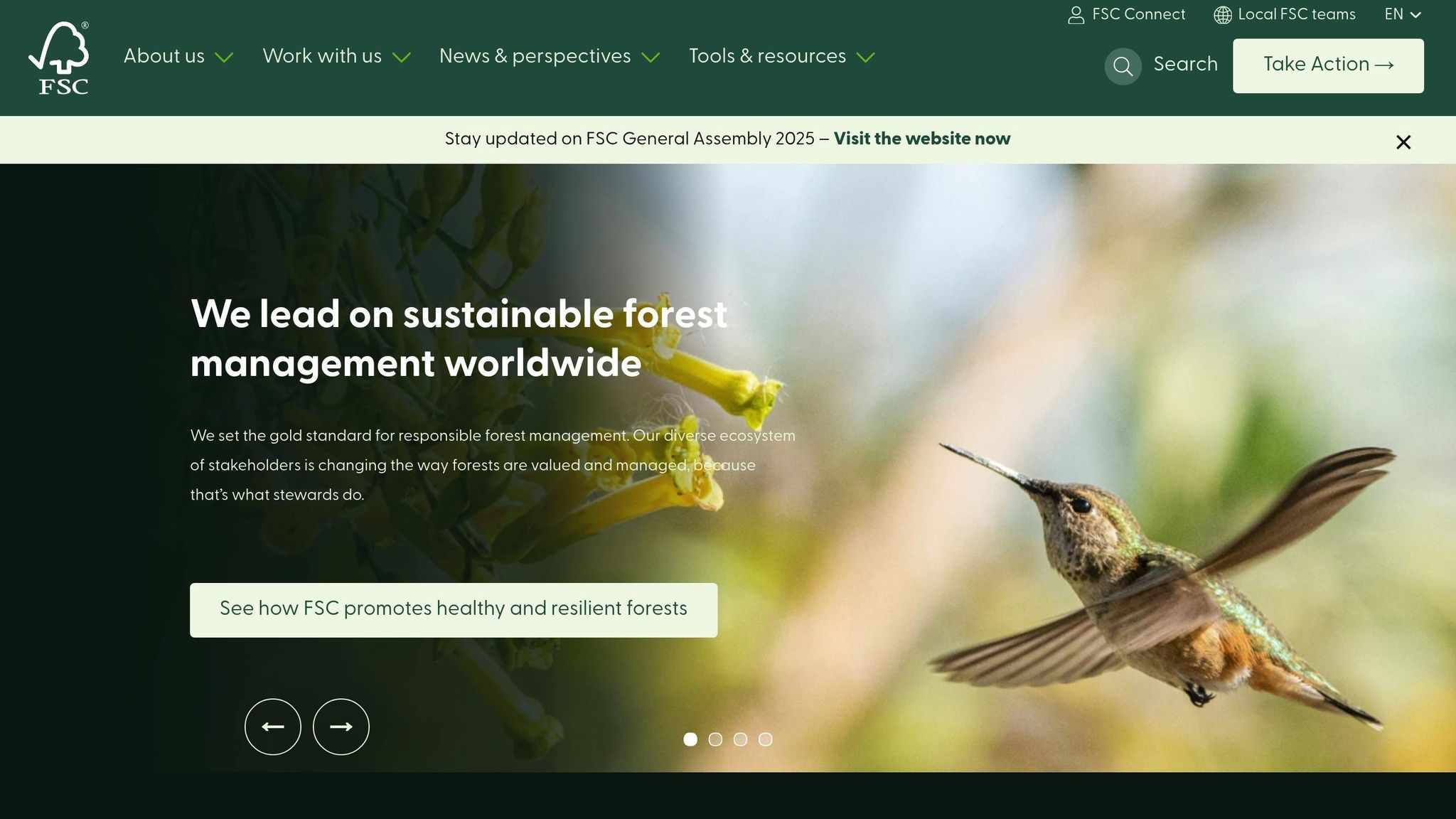
FSC Certified Viscose takes sustainability in fabric sourcing to the next level, offering a responsible option for crafting high-performance fishing apparel.
This viscose is derived from wood pulp sourced exclusively from FSC-certified forests. The certification guarantees that the raw materials are harvested responsibly, supporting sustainable forestry practices and environmentally conscious textile production.
Environmental Impact and Responsible Sourcing
FSC guidelines ensure that viscose production aligns with better forest management practices. This commitment helps combat the environmental challenges linked to unsustainable harvesting by focusing on responsible sourcing and ecosystem preservation.
Why It Matters for Fishing Apparel
FSC Certified Viscose brings sustainable benefits to performance fabrics, making it an excellent choice for fishing apparel. When used in fabric blends, it enhances garments with breathability and moisture-wicking properties - key features for anglers spending long hours on the water. For instance, Reel Comfort’s Fishing Shorts and Men’s Fishing Shorts combine these sustainable materials with the functionality anglers demand.
The Certification Process
Earning FSC certification involves a stringent process that ensures sustainable harvesting and strict chain-of-custody protocols. Every step, from forest to finished product, is carefully monitored to meet environmental and social standards.
Traceability and Ethical Practices
One of the standout features of FSC Certified Viscose is its traceability. Manufacturers can confirm the fiber’s origin, reinforcing confidence in sustainable sourcing. Additionally, FSC standards emphasize ethical production, advocating for fair worker treatment and fostering positive relationships with local communities.
This certification is a key player in advancing eco-friendly, high-performance fishing apparel that anglers can trust.
Certification Comparison Chart
This chart provides a clear overview of various certifications, focusing on their key attributes. It’s designed to help you evaluate sustainable fabric options for fishing apparel, balancing environmental impact, performance, and ethical considerations.
| Certification | Chemical Safety | Environmental Standards | Social Responsibility | Fishing Apparel Benefits | Best For |
|---|---|---|---|---|---|
| GOTS | Prohibits harmful chemicals and substances | Requires at least 70% organic fibers and proper wastewater management | Promotes fair labor conditions and living wages | Skin-friendly, breathable fabrics ideal for long fishing trips | Base layers and comfort fabrics |
| OEKO-TEX Standard 100 | Tests for over 100 harmful substances | Primarily focuses on chemical safety | Does not address social factors | Keeps fabrics safe for prolonged skin contact | Direct-contact fabrics and linings |
| bluesign® | Screens chemicals rigorously, offering safer alternatives | Prioritizes resource efficiency and emissions reduction | Ensures worker safety measures | High-performance, water-resistant fabrics | Outer shells and technical wear |
| GRS | Meets chemical safety basics | Verifies recycled content (minimum 20%) | Includes social compliance standards | Ensures durability in recycled materials | Fishing shorts made with recycled content |
| Fair Trade Certified | Adheres to standard chemical safety regulations | Supports environmental protection efforts | Focuses on fair wages and community support | Promotes ethical fabric production | Cotton blends and natural fibers |
| B Corp Certification | Evaluates company-wide chemical policies | Assesses overall environmental impact | Enforces strong governance and social standards | Encourages brand-wide sustainability efforts | Holistic brand commitment to sustainability |
| USDA Organic | Bans synthetic chemicals in organic farming | Promotes organic agriculture and soil health | Minimal emphasis on social issues | Delivers natural, breathable cotton fibers | Cotton components and blends |
| Cradle to Cradle Certified™ | Assesses material health across the product lifecycle | Rewards renewable energy use and water conservation | Evaluates social fairness | Supports circular design and long-lasting durability | Technical fabrics for extended use |
| EU Ecolabel | Restricts harmful chemicals | Focuses on reducing environmental impact throughout the product lifecycle | Includes basic social criteria | Aligns with European environmental standards | Products targeting the European market |
| FSC Certified Viscose | Ensures chemical safety in viscose production | Promotes responsible forest management | Encourages community and worker engagement | Supports sustainability in sourcing | Sustainable viscose blends |
Performance Priorities for Fishing Apparel
For fishing apparel, chemical safety is essential. Certifications like OEKO-TEX Standard 100 and GOTS ensure fabrics are free of harmful substances, safeguarding your skin during long hours on the water.
Equally important are water resistance and durability. bluesign® stands out for its focus on creating outer layers that can handle harsh marine environments while adhering to environmental standards.
Recycled material certifications, such as GRS, are invaluable for incorporating ocean plastics into durable, eco-conscious fishing gear. This not only reduces marine pollution but also ensures the longevity required for active use.
Often, combining certifications produces the best results. For instance, Reel Comfort's sustainable Fishing Shorts might use GRS-certified recycled polyester for strength, OEKO-TEX certified linings for skin safety, and bluesign® treatments for water resistance.
Cost and Availability Considerations
Beyond performance, cost and availability play crucial roles. OEKO-TEX Standard 100 is widely available and moderately priced, making it accessible for many. On the other hand, certifications like GOTS and bluesign® often come with higher costs due to their rigorous requirements, while GRS provides a balance between affordability and sustainability.
How to Choose Certified Fabrics for Fishing Gear
When you're gearing up for long days on the water, finding fabrics that balance performance and eco-consciousness is key. Certifications can help guide your choices, ensuring your fishing gear meets both your needs and environmental standards.
Chemical safety is a top priority. Certifications like OEKO-TEX test for over 100 harmful substances, while GOTS not only bans these chemicals but also requires fabrics to contain at least 70% organic fibers. This is especially important for items like fishing shorts that are in contact with your skin for hours, ensuring treatments remain safe and non-irritating.
Equally important are water resistance and durability, critical for withstanding the harsh conditions of saltwater environments. The bluesign® certification guarantees that fabrics are produced efficiently while maintaining their protective properties, even after repeated exposure to marine elements.
If you're passionate about reducing ocean pollution, look for recycled content certifications like GRS. These fabrics often incorporate ocean plastics, providing both durability and a direct contribution to marine conservation. For example, men's fishing shorts made with GRS-certified materials offer reliable performance while actively reducing marine waste.
To ensure you're purchasing genuine certified gear, always verify certification logos. Check product labels and confirm their authenticity through trusted databases. This step ensures you're investing in apparel that truly aligns with your values.
Many fishing apparel options combine multiple certifications to optimize both performance and sustainability. For instance, gear made with GRS-certified recycled polyester for strength and OEKO-TEX certified linings for skin safety provides a well-rounded solution. This approach ensures your gear meets rigorous standards, offering long-term durability and comfort.
By adopting a multi-certification strategy, you can trust that your fishing apparel is designed to handle countless trips while maintaining its quality. Rigorous testing for colorfastness and environmental resistance ensures your gear remains reliable, delivering value over time despite potentially higher initial costs.
Want gear that meets these high standards? Check out Reel Comfort's fishing shorts for a combination of comfort, durability, and eco-responsibility on your next fishing adventure.
FAQs
What’s the difference between GOTS and OEKO-TEX Standard 100 certifications for sustainable fabrics?
GOTS, or the Global Organic Textile Standard, is a certification that guarantees fabrics are made from organic materials and follow responsible practices throughout the entire production process. This includes not only the use of organic fibers but also adherence to fair labor standards and environmentally conscious manufacturing.
Meanwhile, OEKO-TEX Standard 100 focuses on ensuring that finished textiles are free from harmful substances, making them safe for human use. Its primary concern is chemical safety, rather than the use of organic materials or broader environmental and ethical considerations.
In essence, GOTS takes a more holistic approach by addressing both environmental impact and ethical practices, while OEKO-TEX zeroes in on the chemical safety of the end product.
What does bluesign® certification mean for environmentally responsible fabrics in fishing gear?
Bluesign® certification represents a commitment to producing fabrics under strict safety and environmental guidelines. It ensures that chemicals are handled responsibly, resources are used efficiently, and pollution is kept to a minimum throughout the manufacturing process. The result? Materials that are safer for people and less harmful to the planet. This makes Bluesign®-certified fabrics a smart option for performance-focused fishing gear, where toughness and environmental responsibility go hand in hand.
Why are multiple certifications important for sustainable fishing apparel, and how do they work together?
Certifications play a key role in ensuring fishing apparel meets high standards for safety, ethics, and environmental responsibility. Each certification addresses a specific area. For example, OEKO-TEX verifies that fabrics are free from harmful chemicals, while GOTS focuses on the responsible processing of organic fibers.
When multiple certifications are combined, fishing apparel can meet a wider range of sustainability benchmarks. This not only assures consumers of the product's safety and eco-conscious design but also supports ethical production practices. Together, these certifications help promote responsible choices that benefit both anglers and the environment.
